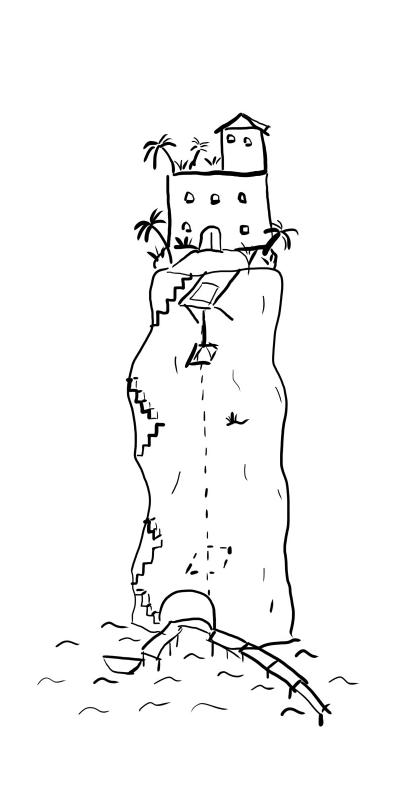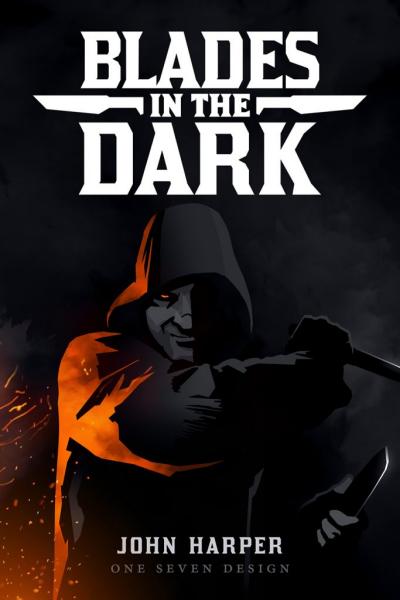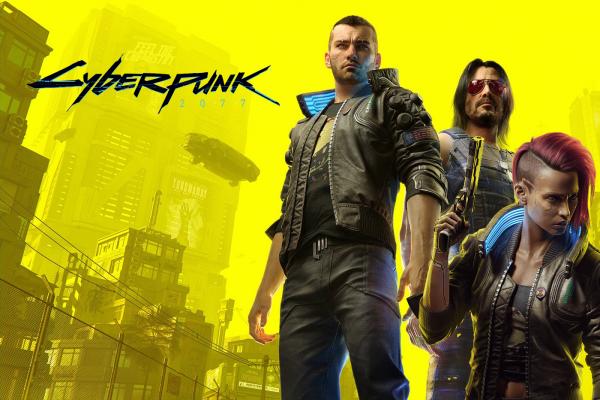Category: uncategorized
Perang’s Mansion in Tual
 The house of the merchant Perang sits on top of a tall spire of rock, similar to the homes of most wealthy and powerful people in Tual. The poorer people live in shacks clinging to the base of the spires, resting on wooden posts, where they frequently get flooded or swept away by the stormy seas.
The house of the merchant Perang sits on top of a tall spire of rock, similar to the homes of most wealthy and powerful people in Tual. The poorer people live in shacks clinging to the base of the spires, resting on wooden posts, where they frequently get flooded or swept away by the stormy seas.
In the Green Sun campaign, Perang turned out to have been replaced by a doppelganger, who died at the hands of the heroes. Tual still exist in Planet Kaendor, and I might use Perang again as an NPC.
Comment as: Google Account
Well, this is a bit akward. But it has been bothering me for quite a while.
I was just browsing through Old School RPG Planet (which is a great thing to have again) and ended up at Beyond Google Plus, and Fixing the Internet, which Melan wrote back in october when the Google Plus shutdown was announced. Good points are being made, and I fully share the distaste for Google and Facebook (and also Apple) permanently trying to monopolize internet communication for the sole purpose of making money by tracing as much of our activities as possible.
I would have liked to just give that old post a simple “Yeah, you’re right!” to give my appreciation, but I ran into my old bane again that has constantly been getting in my way for the last half year or so. When you click on “Select profile…”, there is only one option to pick from:
Google Account.
No! If my only choices are to use a Google Account or don’t comment, then I don’t comment. I think in this day and age, I don’t even have to explain why. We all know very well what Google wants and Google does. It didn’t used to be that way, with Google Account just being one options among many on almost all sites. But at some point, I believe last year, the majority of blogspot sites seemed to have all other options removed at the same time. I kind of suspect that Google made that change quietly for all users and you now have to opt-in to allow people to comment in any other ways.
I think comments are a very neat feature and a great thing to have, since we are really interested in sharing ideas and not just shouting into the void. But there is only so much I am willing to give to Google by choice, and somewhere you have to draw the line. And I think I am not the only one who does. So if you are using blogspot, please check if your comments are restricted to Google Accounts and consider whether you want to enable other options. If you don’t want to, that’s your choice, but given that this changed happened so suddenly everywhere at once, I believe that most people don’t even know the settings were changed without their knowledge.
How Oldschool is Oldschool?
Years ago there where two sites that listed all the recent posts of private RPG websites. Both have disappeared a while back, as far as I know, but Alex Schroeder has now created a new one, in reaction to Google Plus closing.
As someone who never used Google Plus (because I try to limit my interactions with tech megacorps to the bare minimum of Youtube and Android), I’m actually quite happy to see that people have started posting a lot more in recent weeks.
The new aggregator is called Old School RPG Planet, and I am not in it. Yet. The description says that “The Old School RPG Planet is for Old School Renaissance (OSR) or Do It Yourself (DIY) bloggers.” I feel that I am sufficiently do it yourself to qualify and it does say “OSR or DIY”, so after some consideration I send Alex a mail to add me.
But I still hesitated because it says “Old School RPG”. Am I sufficently oldschool to qualify as oldschool? One the one hand, I recently started to appreciate D&D 5th edition and am right now working very energetically on setting up a campaign. I think, by definition, WotC games can not be oldschool games. But on the other hand, my style is all about unscripted wilderness adventures, random encounters, resource management, and interactivity, and I am hugely into both 30s and 80s Sword & Sorcery. And isn’t that what oldschool has always been really about? Before the Gygaxian orthodoxy?
Oh, no! I am writing about that thing nobody wants to hear anymore.
Yes, that thing. Or “thing”. OSR.
I was just peeking in again at Dragonsfoot, and unexpectedly, though it really shouldn’t have surprised me, I almost immediately came upon onother recent discussion of “What is OSR?” And my first reaction was “probably better not click at it, it’s almost certainly just more bickering and doom mongering about the state of western society”. This is the point where we are now. Where I think we’ve been for quite a while now. And I very much doubt that I am in a small minority of people having this reaction. I did end up looking into that thread and yes it was primarily about bitching about the collapse of western society. I didn’t read very far, but there were some intitial points raised that made me come to a conclusion about the various feelings I’ve had on the subject.
OSR has been over for a couple of years now. It’s not dead, it’s been concluded.
From how I experienced it, that thing that later became known as OSR began in the mid 2000s when the 3rd Edition of Dungeons & Dragons kept bloating and bloating until it was eventually discontinued and the plans for the new 4th Edition were increasingly looking like a drastic departure from all that had come before. And for a lot of people, that was the point where they said “I’m no longer wishing to keep up with current developments. I’m just going back to play the game the way I had enjoyed the most and stick with that.” OSRIC had actually been out since 2006, two years before 4th Edition. But I think the end of 3rd Edition really was the point where a lot of people paused to reflect about whether they wanted to hop onto this new thing or stick with their current thing, or perhaps even go back to an older thing.
And I think it is this reflection that really was this thing that went on to become known as OSR. Old School Reflections? It wasn’t just people thiking to themselves with which game edtion they had the most fun, but engaging in a wider conversation on why they feel they had more fun through the medium of blogspot sites. It was a period in which people dug into old rulebooks to critically analyze the mechanics and advice given in them, and exchange their experience with other GMs who were doing the same. Many things that had been discarded and dismissed as silly where quite literally rediscovered, and with the great wealth of experiences that had been gathered over the decades could now actually be much better understood. Old School Research?
The thing with research of this kind is that you often make lots of easy big discoveries early on, some more difficult discoveries later, and after that only very rarely minor and obscure discoveries of little impact to the bigger field. And I think this is exactly what we’ve been seeing here. All the really big and exciting stuff in OSR happened between about 2008 and 2010. Then the ocasional neat new idea up to maybe 2014, but since then I don’t think anyone has been making any new major contributions to the field. The Rennaisance had reached its end, it’s work been done.
It’s not like all of it went up in smoke and feded into the wind. I would argue the opposite. Of course, it seems quite ridiculous to say that the 5th Edition of Dungeons & Dragons is an OSR game. It really isn’t. But it is also very hard to deny that during the creation of this new game, the creators did draw significantly from this knowledge reintroduced into the sphere of fantasy adventure games by the old school revivalists. Not everything has been widely embraced, some things remain the domain of fringe enthusiasts. But the creative and intelectual space of roleplaying games today is fully suffused by ideas that came out of this period of reflections about what made early RPGs tick. If the term Old School Rennaisance makes any sense, then this is what it’s really about.
This does leave us with this somewhat strange position in which we are finding us today. Today, when something gets labled as OSR, it really is an “Old School Roleplaying Game”, which is “D&D Editions released by TSR”. It is a group of games, one among many other options that groups can chose from. But I think many people are fondly remembering the creative movement from a decade ago and are still somewhat under the impression that the two are still the same thing. And when there is nothing really left to discover or create, the only thing left to “the movement” is an endless cycle of self-reflection. Which is a conversation lots of people see little appeal in, which in turn provides much more space and attention for people who relish bickering. There probably has always been bickering, but with the intelectual and creative conversation having been concluded, that little bickering is now the only thing that is still going on.
Looking at my archive of posts, I stoppded using the OSR tag in mid 2017, almost two years ago now. It’s not that I no longer care about reaction rolls and morale checks, random encounters, encumbrance, noncombat-XP, and monsters that are safer to circumnavigate then to fight. I still love them, and I discovered their value from the great ongoing conversation about older RPGs. But all the things I am doing and writing now don’t feel to me like contributions to this discussion. A discussion that has concluded.
Planescape Finances
Whatever you do in Sigil, never do financial business with the factions.
Doomguard: “Short sell on everything!”
Dustmen: Always read the fine print on interest rates.
Fated: “Greed is good.”
Revolutionary League: “You can’t trust banks and governments. Invest everything in gold!”
Sensates: Could bancruptcy be a valuable enlightening experience?


